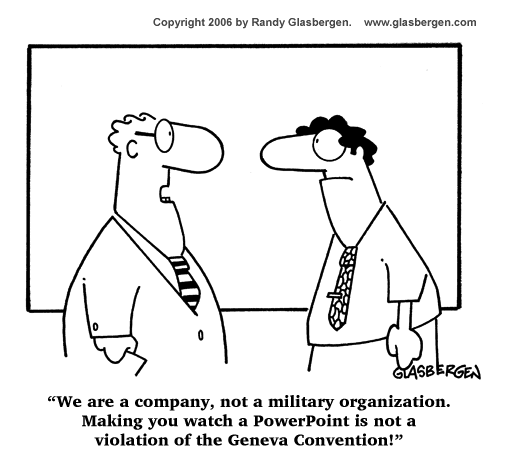Presentations
Task 1:
Listen to a radio interview with a communications consultant about
giving presentations. Answer the questions below.
1. How does
Melanie define a good presentation?
Well prepared, well delivered.
2. What three Ps of presentations does she mention?
Planning, preparation, practice.
3. Why is it important to consider your audience when preparing a
presentation?
 Because you don’t want your presentation to
fall on deaf ears.
Because you don’t want your presentation to
fall on deaf ears.
4. How can you start your presentation? Give
examples.
You can begin with ice-breakers. For examples,
Jokes, pictures, introductory remarks.
5. What is a presentation outline?
It’s a point form plan.
6. How can an outline help you in giving a good presentation?
You know what you want to talk about. Develop contcant.
7. What are signposts?
Phsiphics Expressions (first of all, now for my next
point).
8. What other aspects of a presentation are important?
Body language, and voice.
Task 2:
Listen to the interview again. Pay attention
to the expressions below. Try to define each one based on your understanding,
and then answer the questions below.
|
Idiom
|
Meaning
|
|
fall on deaf ears
|
(of a statement or request) be ignored,
not paying attention
|
|
be second nature
|
A tendency or habit that has become characteristic or instinctive
|
|
frame of mind
|
A particular mood that influences one’s attitude or behaviour
|
|
with someone in mind
|
while thinking about someone or something
|
|
ice-breaker
|
A thing that serves to relieve inhibitions or tension between
people
|
|
attention grabber
|
Something which (or occasionally someone who) grabs attention
|
|
tried and tested
|
Denoting something that has proven in
the past to
be effective or reliable
|
Task 3:
1. What does Melanie mean when she says a presentation can fall
on deaf ears?
If the presentation is boring, the audience will ignore it.
2. What is an ice-breaker?
In what situations, other than presentations, would you use an
ice-breaker?
A thing that serves to relieve inhibitions or tension between people. In meeting, having dinner with new friends, at the beginning of a party.
3. What does Melanie mean
by a good frame of mind for listening?
Having general idea of how familiar the audience they are with the topic, what they need to learn, what you think will intrest them.
4. What does Melanie mean
when she says to some people public speaking is second nature?
Some people can do pubilc speaking well without practicing.
5. What is an attention
grabber? What example of an attention grabber does Melanie give?
Something which (or occasionally someone who) grabs attention. Jokes, introductory remarks, pictures.
6. When Melanie
says you need to have your audience in mind when you plan your talk,
what does she mean?
To have the audience in mind.







